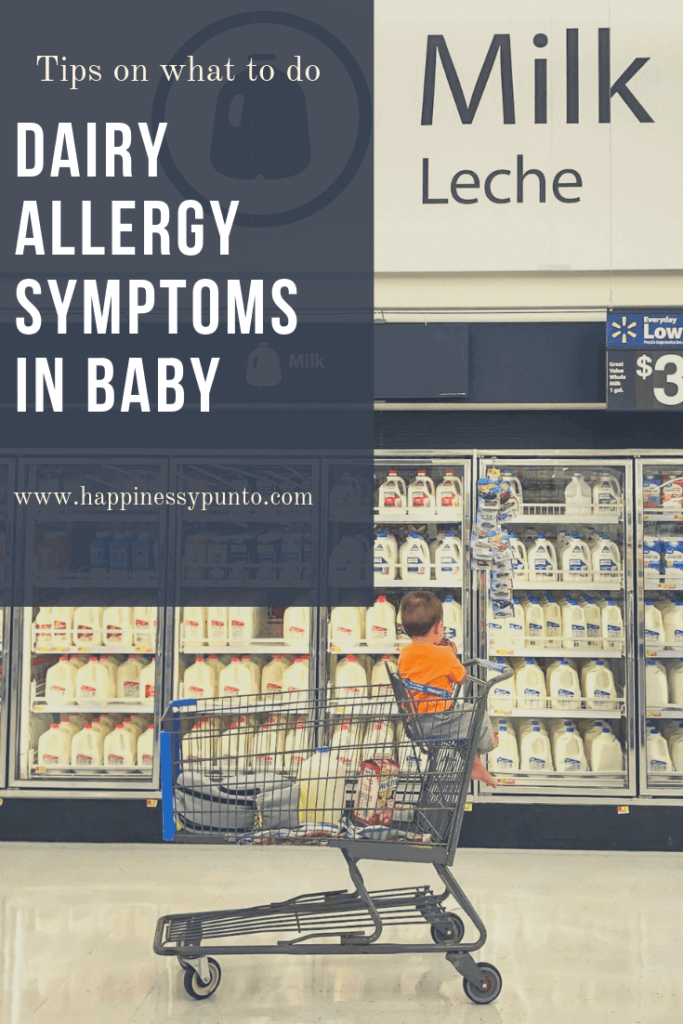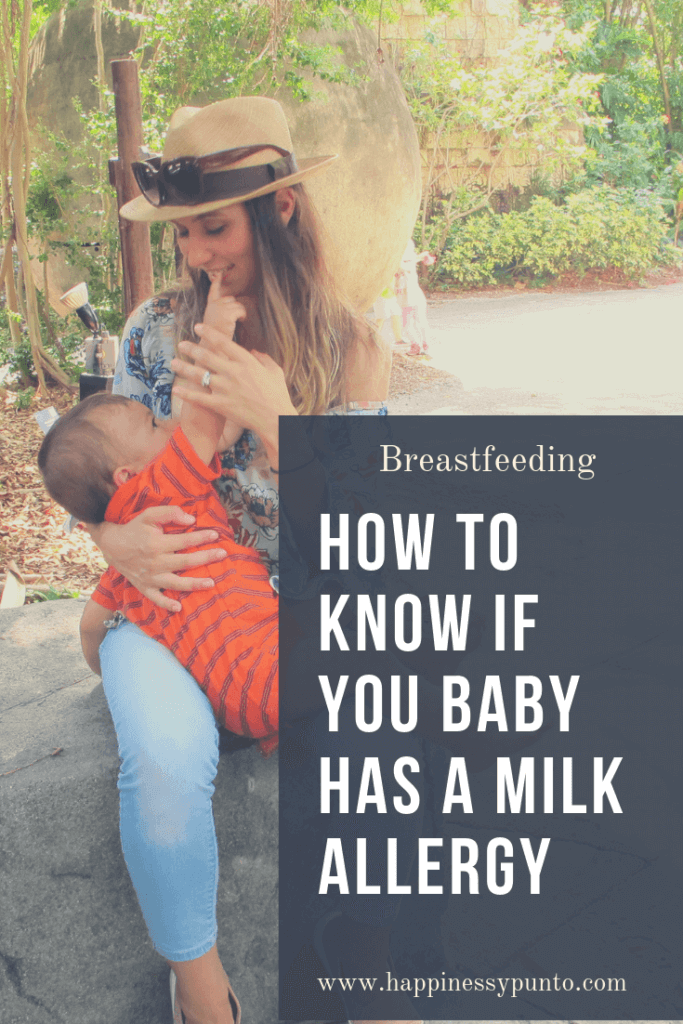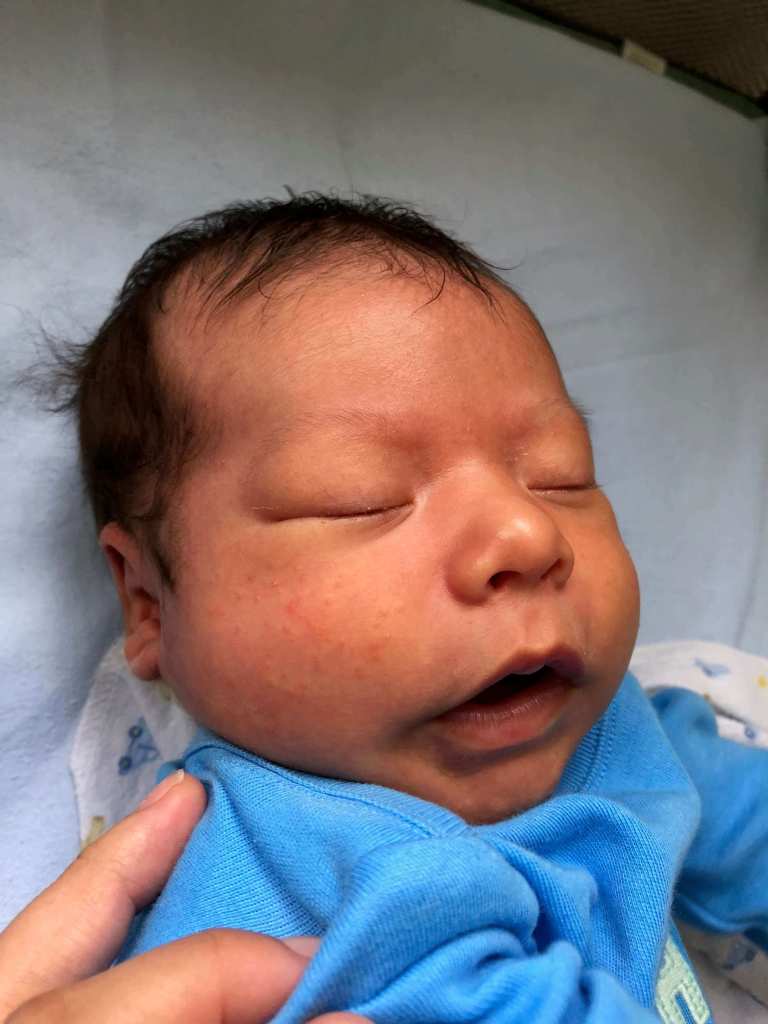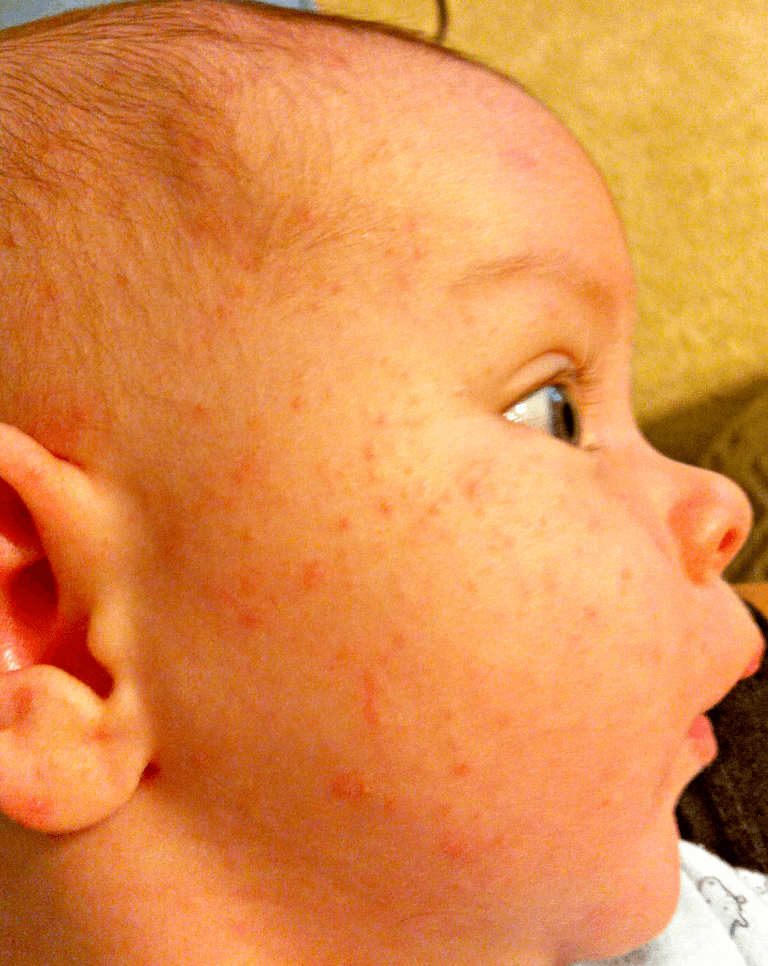This post contains affiliate links. That means if you buy using my link I get a percentage of the sale. I only share what I really like and think you will find value
Did you know that milk allergy is the most common food allergy in infants and young children especially when breastfeeding?
Cow’s milk protein dairy intolerance or allergy in baby is common in about 2-3% of babies under 3 years old and is most likely to develop in the first year of life.
My baby fell into that 2-3% and it was a really scary time! I didn’t know what it meant, What to do and how to fix it.
Even though babies are being fed primarily breastmilk, it is true that they can develop allergies to the cow’s protein causing a series of symptoms. If you suspect your baby is having a milk reaction you need to mention it to your pediatrician so he can give you a referral to a pediatric gastro.
Here is my journey, so that you can understand a little bit the steps I had to take, the doctors I had to visit and the changes I had to make to make this better for my baby.
of course, my story is different than yours as all babies are different! Mine was quite scary as they thought it was something else and not just a dairy/milk issue…. I’ll share more in a bit.
If you do confirm your baby has a milk allergy, don’t worry mama! most will outgrow it by their first birthday – and if not, then maybe by their third birthday.

How does a dairy allergy in baby occur?
If you use formula, a lot of formulas use cow milk as a base. In this case, the easiest is to change to a dairy free milk. The most commonly used is nutramigen. (My baby didn’t like it so we had to try a few different ones as we were supplementing with formula).
If you breastfeed, most of the food you eat find a way into the breastmilk. That means some of the cow’s milk you drink also finds its way into the baby’s body.
if your baby has a milk intolerance he can become very gassy, have loose stool, and get skin eczema.
My baby (Manny) had this allergy so bad, that he didn’t just get the discomfort and the skin eczema, his face got super swollen. (I wish I didn’t have erased the swollen face photo because to show you- but at that time I wasn’t writing a blog and they were too scary to keep on my phone- so I erased them).
How do I know if my breastfed baby has a dairy allergy?

Although, seeing your baby react this way could be scary. Don’t take this lightly, It is advised that you take the baby right away to the pediatrician to ensure that the reaction is, in fact, a cow milk intolerance and not something else.
A Diary Allergy in a baby can be scary. Discuss with your pediatrician your concerns right away.
Manny was born Coombs positive (my blood type was different as his so my blood cells where attacking his cells), and because of this, the doctor had been taking blood samples each week.
when I mentioned his eczema and swollen face, he took a look at the blood sample and immediately noticed his platelet count was abnormally high.
What this meant was that it could be a dairy intolerance or it could’ve been something else – leukemia- talk about scary! Luckily it was just dairy allergy but it was quite scary as a mom of a newborn to heat that.
No matter the case dairy allergy in a baby can be very scary!

Our pediatrician gave us a referral to a pediatric hematologist (Because it could’ve been leukemia) as well as a gastroenterologist (Because it could’ve been dairy intolerance) so they both could do some additional blood tests.
For many weeks his blood was monitored until the levels went down. In the meantime I was doing what I could on my side to manage the Milk intolerance.
If you suspect your baby is intolerant to dairy products, here are a few things you can do

Don’t panic
This should be the very first thing. Recognize that you are not alone, and the situation can be effectively managed.
as soon as you suspect the intolerance, stop all dairy consumption (stop any lactose-free products as well) and make an appointment with the pediatrician so he can evaluate your baby and give you a referral.

Use an Eczema Treatment cream
There are many reasons a baby can get eczema, for us it was from the dairy intolerance. after trying a few creams, this was the only cream that worked for us to treat the bad eczema he developed.
We got it at Amazon – here
Confirm the dairy allergy in your baby
For formula fed babies, change the formula to a dairy-free formula like Nutramigen.
If you breastfeed, dairy products recently, that might be enough to convince you this could be the root of the problem.
For a very mild to moderate reaction, stop drinking cow’s milk and remove all dairy products from your diet.
Wait about 3 weeks after the first reaction and take a little dairy again. Notice if your baby gets eczema and feels any discomfort.
Why wait three weeks?
it takes three weeks for the dairy to get out of your system, so even though you have stopped dairy intake you could still see signs of intolerance.
Cut back on dairy foods
One mistake many mamas make is switching to lactose free thinking that will help. I get it, is super hard to remove all dairy products! Milk, cheese, yogurt, cream cheese, hey! Even cookies as some use milk!
but the issue is not a lactose allergy, is a milk protein issue so you must remove all sources of milk.
Recommended Non-Dairy Milk
You could drink other milk alternatives in the meantime. I Tired almond milk, oat milk milk, sesame seed milk, and I even tried vegan cheese and almond milk yogurt.
Re-introduce dairy after 6 months
Most babies will outgrow their aversion for cow milk and other dairy products in their first 6 – 18 months. The most common is that they will outgrow it after their first birthday.
If you try again and they still react, you should wait for longer – most babies outgrow it fully by the time they are 3 years old. (Manny our few it at 1.5 years old)
The aim of re-introducing the diary product is to help your baby get accustomed. Avoiding it altogether might make dairy products a lifelong allergen for your baby.
Conclusion
While the cases of diary allergies in babes are far and in-between, they do happen.
Suspecting a dairy allergy can be scary as a new mom. We want to do the best for our babies and want to fix everything that is wrong. Confirm with your pediatrician or gastro if in fact your baby is allergic to milk and take the steps mentioned above.
your baby should start feeling better in no time! I even found out my that discomfort my whole life was milk – and I only found out because my son’s milk intolerance and I removed all milk products from my diet.
You got this mama! Confirm the allergy, remove milk products, And treat the eczema with a cream.

This is a great post. My firstborn had this allergy and the doctor didn’t believe me. He went un-diagnosed for five months and was miserable the whole time. We ended up having to put him on a prescription formula that cost more than the food for my husband and I.
Omg! I’m so sorry! I can’t image how it was living with that being I diagnosed. It was hard for us when we were trying to figure it out as well
I had this issue with both of my kids, and it was a struggle. Thanks for sharing, it is more common than most people think!
Yes its common and now even pediatricians are even paying more attention to it
Good info to know! My brother was intolerant as an infant
A lot of babies are and it goes unnoticed